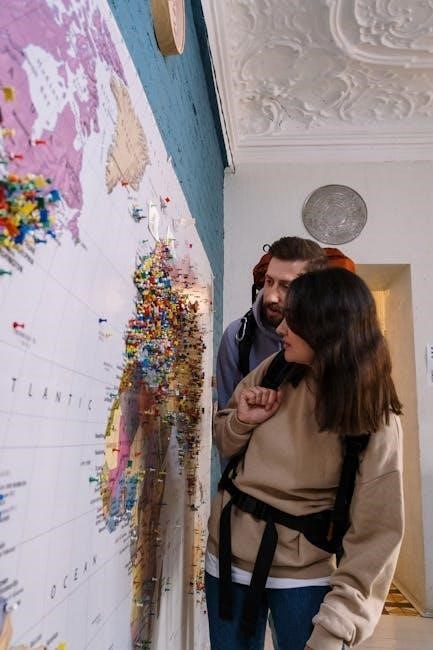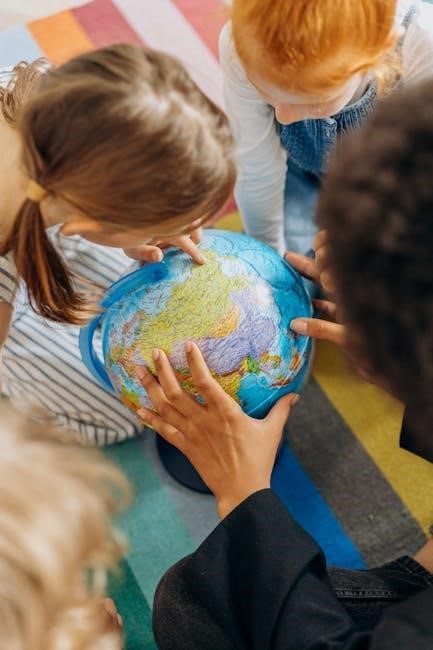Exploring the religions of our world offers a profound understanding of human culture, fostering empathy and dispelling misconceptions. It reveals the rich diversity of faiths, providing insights into their origins, practices, and significance. By studying these traditions, we gain wisdom and a deeper appreciation for the global community, enriching our perspective on life and spirituality.
1;1 Overview of Religious Diversity in the Modern World
Modern society is characterized by a vibrant tapestry of religious beliefs, with major traditions like Christianity, Islam, Buddhism, and Hinduism coexisting alongside smaller, indigenous faiths. This diversity reflects historical, cultural, and social dynamics, shaping identities and communities globally. Understanding this pluralism is essential for fostering mutual respect and addressing contemporary challenges of coexistence.
1.2 Importance of Studying World Religions
Studying world religions fosters empathy and understanding, bridging cultural divides. It provides insights into humanity’s search for meaning, offering wisdom from diverse traditions. By exploring these faiths, we dispel misconceptions, enrich our cultural awareness, and gain tools to address global challenges, ultimately promoting harmony and cooperation in an interconnected world.
Understanding Religion
Religion is a universal aspect of human life, shaping identity, culture, and beliefs. It provides meaning, purpose, and a framework for moral and ethical living, influencing societies globally.
2.1 Defining Religion and Its Significance
Religion is a complex system of beliefs, practices, and rituals that provide a moral framework and spiritual guidance. It shapes identity, offers purpose, and fosters community, playing a crucial role in personal and societal development across cultures and history.
2.2 Types of Religions: Monotheistic, Polytheistic, and More
Religions vary widely, with monotheistic faiths like Christianity and Islam worshipping one deity, while polytheistic traditions like Hinduism honor multiple gods. Other types include animism, focusing on nature spirits, and atheistic religions like Buddhism, emphasizing spiritual practices without deities. This diversity reflects the rich tapestry of human belief systems and cultural expressions.

Major World Religions
Major world religions, such as Christianity, Islam, Buddhism, Hinduism, and Judaism, shape billions of lives globally. Each offers unique beliefs, practices, and cultural influences, reflecting humanity’s diverse spiritual journey.
3.1 Christianity: Beliefs, Practices, and Historical Context
Christianity, rooted in the teachings of Jesus Christ, emphasizes monotheism, the Holy Trinity, and salvation through faith. Practices include sacraments, prayer, and Bible study. Originating in the 1st century, it spread globally, shaping cultures and traditions, becoming a cornerstone of Western civilization while maintaining its core message of love and redemption across diverse communities.
3.2 Islam: Core Teachings and Global Impact
Islam, a monotheistic religion, centers on the Quran and the Five Pillars: Shahada (faith declaration), Salat (prayer), Zakat (charity), Sawm (fasting), and Hajj (pilgrimage). Founded in the 7th century, it emphasizes submission to Allah and moral guidance. Islam’s teachings on compassion, justice, and equality have shaped cultures, influencing art, science, and law, while fostering a global community united by shared values.
3.3 Buddhism: Philosophy, Practices, and Cultural Influence
Buddhism, founded by Siddhartha Gautama, emphasizes the Four Noble Truths and the Eightfold Path, guiding individuals toward enlightenment and the end of suffering. Practices include meditation and mindfulness, fostering inner peace. Buddhism’s cultural influence is vast, shaping art, philosophy, and community life across Asia and beyond, offering timeless wisdom for personal and societal transformation.
3.4 Hinduism: Key Concepts and Rituals
Hinduism, one of the world’s oldest religions, emphasizes karma, dharma, and moksha. Central deities include Brahma, Vishnu, and Shiva. Rituals like puja, involving offerings to deities, are integral to daily life. Practices such as yoga and meditation reflect Hinduism’s diverse philosophical and spiritual traditions, shaping culture and identity across generations.
3.5 Judaism: History, Traditions, and Cultural Significance
Judaism, one of the world’s oldest monotheistic religions, traces its roots to Abraham. Core traditions include the Torah, Sabbath observance, and dietary laws. Jewish identity is deeply tied to history, from the Exodus to the Diaspora. Rituals like circumcision and Passover reflect a rich cultural heritage, emphasizing community, ethical living, and the enduring covenant with God.
Religious Practices and Rituals
Religious practices and rituals are vital expressions of faith, connecting believers to their beliefs. They include sacraments, prayer, meditation, and symbolic acts that deeply enrich spiritual journeys.
4.1 Sacraments and Ceremonies Across Religions
Sacraments and ceremonies are sacred rituals in many religions, symbolizing divine connection. Christianity’s baptism and Eucharist, Hinduism’s Upanayana, and Islam’s daily prayers exemplify these practices. They mark life milestones, foster spiritual growth, and strengthen communal bonds, reflecting the diverse ways faith is expressed and celebrated across cultures and traditions.
4.2 The Role of Prayer and Meditation
Prayer and meditation are universal practices, serving as bridges between the human and the divine. They offer solace, guidance, and spiritual growth, fostering inner peace and connection. Across religions, these rituals vary, from Christianity’s conversational prayers to Buddhism’s mindful meditations, yet they unite believers in their quest for meaning, comfort, and enlightenment in daily life.
4.3 Symbolism in Religious Practices
Symbolism plays a vital role in religious practices, conveying deeper meanings and spiritual truths. From the cross in Christianity to the Om in Hinduism, symbols connect believers to the divine, enriching rituals and fostering devotion. They serve as powerful tools for storytelling, teaching, and uniting communities, transcending language barriers and cultural differences.
These symbols often represent sacred concepts, embodying the essence of faith and tradition, and inspiring followers to reflect on their spiritual journeys and connection to the transcendent.

Ethics and Morality in Religion
Religions provide moral frameworks, guiding principles, and ethical standards that shape human behavior and societal norms, fostering compassion, justice, and righteousness in individual and communal life.
5.1 Moral Codes and Their Role in Society
Moral codes, rooted in religious teachings, provide ethical guidelines that shape societal norms and individual behavior. They promote values like compassion, justice, and righteousness, fostering harmony and stability. These codes often influence laws, education, and cultural practices, serving as a foundation for ethical decision-making and collective well-being.
5.2 Comparing Ethical Systems Across Religions
Religious ethical systems share common values like compassion and justice but differ in application. Christianity emphasizes love and forgiveness, while Buddhism focuses on mindfulness and non-harm. Islam highlights fairness and accountability, and Hinduism stresses duty and righteousness. These systems, though unique, collectively guide followers toward moral living, reflecting shared human aspirations for goodness and harmony.

Interfaith Dialogue and Cooperation
Interfaith dialogue fosters understanding and respect among diverse religious communities, promoting collaboration to address global challenges. Open communication and mutual respect are key to building unity and harmony.
6.1 Promoting Understanding and Respect
Interfaith dialogue fosters understanding and respect by encouraging open communication and empathy among diverse religious communities. By sharing perspectives and values, individuals can dispel fears and misunderstandings, creating a foundation for mutual respect and collaboration to address global challenges.
6.2 Challenges and Opportunities in Interfaith Engagement
Interfaith engagement faces challenges like differing beliefs and historical conflicts, yet offers opportunities for collaboration and mutual understanding. By addressing these challenges, communities can foster cooperation, address social issues, and build bridges, transforming potential conflicts into avenues for growth and shared progress.

The Impact of Religion on Culture and Society
Religion profoundly shapes culture, influencing art, literature, and architecture, while also impacting laws and social movements. It serves as a foundation for moral values and societal norms across diverse communities.
7.1 Influence on Art, Literature, and Architecture
Religion has inspired masterpieces in art, literature, and architecture, reflecting spiritual values and cultural identity. From grand cathedrals to intricate Buddhist stupas, religious themes evoke deep emotional and intellectual connections, enriching human expression and fostering creativity across civilizations. Sacred texts and stories have also shaped literary traditions, preserving history and ethics for future generations. Such contributions remain timeless and universal.
7.2 Religion and Law: Historical and Contemporary Perspectives
Religion has profoundly shaped legal systems throughout history, influencing moral codes and societal norms. Many laws, such as the Ten Commandments, originate from religious teachings, while contemporary legal frameworks often reflect ethical principles rooted in faith. Today, religion continues to impact legislation, human rights, and justice systems, bridging spiritual values with civic responsibilities across diverse cultures and nations.
7.3 Social and Political Movements Inspired by Religion
Religion has been a catalyst for numerous social and political movements, shaping societies and advocating for justice. From the Civil Rights Movement led by Martin Luther King Jr. to liberation theology in Latin America, religious teachings have inspired activism, promoting equality and human dignity. These movements highlight the transformative power of faith in addressing societal inequities and fostering change.
Spirituality and Personal Faith
Spirituality and personal faith are deeply personal journeys, shaping individual identities and providing meaning in life. They offer a path to inner peace, purpose, and connection to something greater, fulfilling emotional and existential needs while fostering personal growth and resilience in a diverse world.
8.1 Personal Journeys of Spiritual Exploration
Personal journeys of spiritual exploration involve seeking meaning, purpose, and connection to something greater. They often include questioning beliefs, embracing new practices, and finding inner peace. These journeys are deeply individual, reflecting unique experiences and quests for understanding. They foster personal growth, resilience, and a deeper appreciation for life’s complexities and mysteries in a diverse world.
8.2 The Role of Faith in Individual Lives
Faith plays a vital role in shaping individual lives, offering comfort, guidance, and purpose. It influences decisions, fosters resilience, and provides a moral framework. For many, faith serves as a source of strength, helping navigate life’s challenges and uncertainties. It also creates a sense of belonging and connection to a larger community, enriching personal and spiritual growth in a diverse world.
Religion in a Globalized World
Globalization has reshaped religious landscapes, fostering cross-cultural exchange and challenging traditional practices. Migration and technology spread religious ideas, creating diverse spiritual communities and addressing modern ethical dilemmas.
9.1 The Spread of Religious Ideas Through Migration
Migration has historically facilitated the spread of religious ideas, as people carry their beliefs to new regions. This process enriches cultural diversity, fostering global spiritual tapestries. Modern migration continues this trend, with displaced populations introducing their faiths to host communities, creating dynamic exchanges and shaping religious landscapes worldwide.
9.2 The Impact of Technology on Religious Practices
Technology has transformed religious practices, enabling virtual worship and global connectivity. Social media and online platforms facilitate the dissemination of religious teachings, while digital tools enhance meditation and prayer. However, this shift also raises questions about authenticity and accessibility, challenging traditional norms while expanding spiritual engagement in unprecedented ways.
9.3 Challenges of Religious Pluralism
Religious pluralism presents challenges, including misunderstandings and societal tensions, as diverse beliefs coexist. It requires fostering mutual respect and dialogue to address conflicts and promote harmony. Education and interfaith initiatives play a crucial role in bridging gaps, ensuring peaceful coexistence amid differing religious perspectives and cultural practices in an increasingly interconnected world.
Exploring the world’s religions reveals their profound impact on human culture and spirituality, fostering mutual understanding and respect in our diverse global community.
10.1 Summarizing the Significance of Exploring World Religions
Exploring world religions fosters cultural and spiritual understanding, revealing the richness of human beliefs and practices. It provides insights into origins, philosophies, and traditions, promoting empathy and respect. By examining diverse faiths, we gain a deeper appreciation for global unity and the role of religion in shaping societies, fostering peace and mutual understanding.
10.2 Final Thoughts on the Importance of Religious Understanding
Understanding world religions is crucial for fostering empathy and unity in a diverse global community. It bridges cultural gaps, reduces misunderstandings, and promotes peace. By embracing religious knowledge, individuals gain a deeper appreciation for the values and beliefs that shape human behavior, ultimately enriching personal growth and societal harmony in our interconnected world.